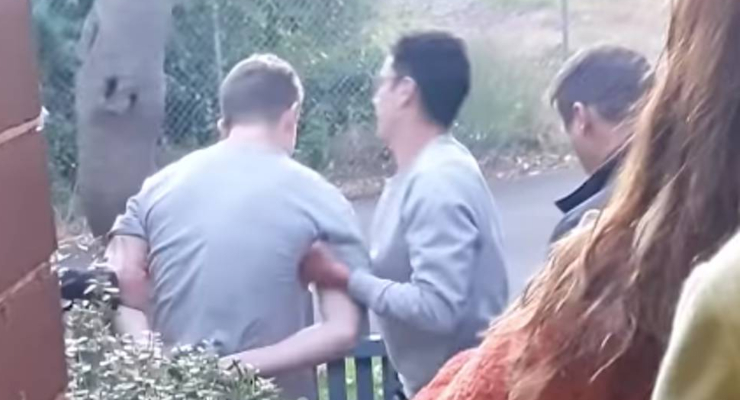
Politicians need thick skin. From your first day as a candidate, you should anticipate frequent public confrontations with aggrieved constituents, ear-splitting protesters, brash journalists and obnoxious commentators. It comes with the territory.
When I was prime minister, the media would frequently camp outside my home, stake out my electorate office and throng my local church on Sundays. I even once found a reporter lurking in the pew behind me, apparently trying to eavesdrop.
John Howard copped similar treatment, most notably on his morning walks, and managed with great dignity. The ABC’s political comedy troupe, The Chaser, followed both of us around the country for months, involving us in increasingly bizarre stunts.
In short, every politician is followed around by folks they don’t like. But I never considered asking counterterrorism police to round them up on stalking charges as NSW Deputy Premier John Barilaro has done.
Barilaro is suing sharp-tongued comedian Jordan Shanks-Markovina over a series of videos accusing him of corruption on his YouTube channel, friendlyjordies. This is his right under defamation law; the comedian says he will prove the truth of his claims against the deputy premier, who proudly calls himself “Pork-Barrel-aro”. We await that trial.
But Barilaro has radically escalated this civil feud into the criminal courts by pressing stalking charges against friendlyjordies’ producer Kristo Langker — a camera-toting 21-year-old who had approached Barilaro twice in public (separate incidents six weeks apart) about the defamation matter.
Within a few hours of the latest incident, on June 4, the NSW Police Fixated Persons Investigations Unit — the outfit that deals with suspected “lone wolf” extremists — was diverted from other duties to arrest Langker at his suburban home. The footage is distressing, involving a scuffle that reportedly injured his mother and dog.
Langker’s lawyer Mark Davis — a Gold Walkley-winning journalist turned lawyer — has described the arrest as a “shocking abuse of power”. Having watched the footage, I find it disturbing. What’s more, the account relied on by police is alleged to be riddled with false claims about Langker’s behaviour that are not borne out on video.
I will not pre-empt the outcome of the case. But these events raise broader questions about what the future holds for the media, for powerful individuals, for the police, and for the public.
The threat to free speech is clear. While he awaits court, Langker’s bail conditions prevent him even commenting on Barilaro’s appearance or behaviour. He’s not even allowed to possess a photograph of him. He is effectively gagged. These are extreme constraints on an individual who is presumed to be innocent. All freedom-loving Australians should be chilled to the bone.
Professional journalists should take special note. Whether or not you approve of Shanks-Markovina’s style — always irreverent, often abrasive and sometimes obnoxious — the substance clearly includes elements of journalism, inquiring into matters of public interest and publishing information and opinions about them.
If this gag is the consequence of approaching a minister in a public place twice in two months, it’s legitimate to ask what sanctions await media workers who linger outside their homes and offices? What about those who obtain the private phone numbers of public figures and bombard them with unsolicited calls and text messages?
Forget the chilling effect of civil defamation law. If daily journalism becomes a question of criminality, we all suffer.
Depending on the outcome of this matter, the nation’s rich and powerful may test any new principle to its limits. It may be cold comfort that if such arrests were ever based on misleading information to police those public figures would be torching their own reputations along with any future political aspirations.
The consequences are also profound for the public’s confidence in the police. Law enforcement agencies operate at arm’s length from government, but they know it’s the politicians who allocate budgets, appoint commissioners and write legislation. For that reason, they should not just operate but be seen to operate in that way.
It’s not difficult to find an Australian whose complaint to police has taken forever to investigate for lack of resources, especially among Australian women. Against that backdrop, the visuals of police swooping on a comedy writer within hours of receiving a complaint involving the deputy premier is jarring. It could severely erode public trust.
It’s no secret that there’s little affection for friendlyjordies in the media establishment. The channel has copped plenty of barbs for its pro-Labor sympathies, vicious caricatures and puerile humour.
These media critics demand Labor figures boycott the channel yet don’t seem to worry when Liberal ministers fawn over the far-right polemicists of Murdoch’s Sky News who argue the pandemic may be orchestrated by vaccine manufacturers in league with the United Nations and the CIA.
But whatever your feelings about friendlyjordies, the potential consequences of these legal battles are too big to ignore. For that reason, I have donated to Langker’s legal defence fund and encourage others to do so.
In the meantime, I respect Barilaro’s right to defend his reputation in the civil courts. But on reflection, doesn’t pressing criminal stalking charges at the same time cause us all concern?








Crikey is committed to hosting lively discussions. Help us keep the conversation useful, interesting and welcoming. We aim to publish comments quickly in the interest of promoting robust conversation, but we’re a small team and we deploy filters to protect against legal risk. Occasionally your comment may be held up while we review, but we’re working as fast as we can to keep the conversation rolling.
The Crikey comment section is members-only content. Please subscribe to leave a comment.
The Crikey comment section is members-only content. Please login to leave a comment.